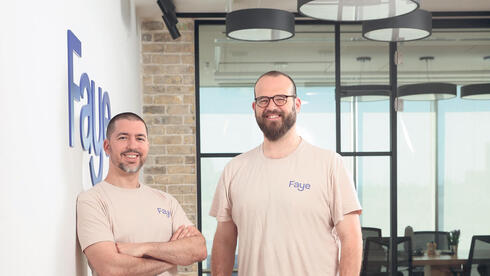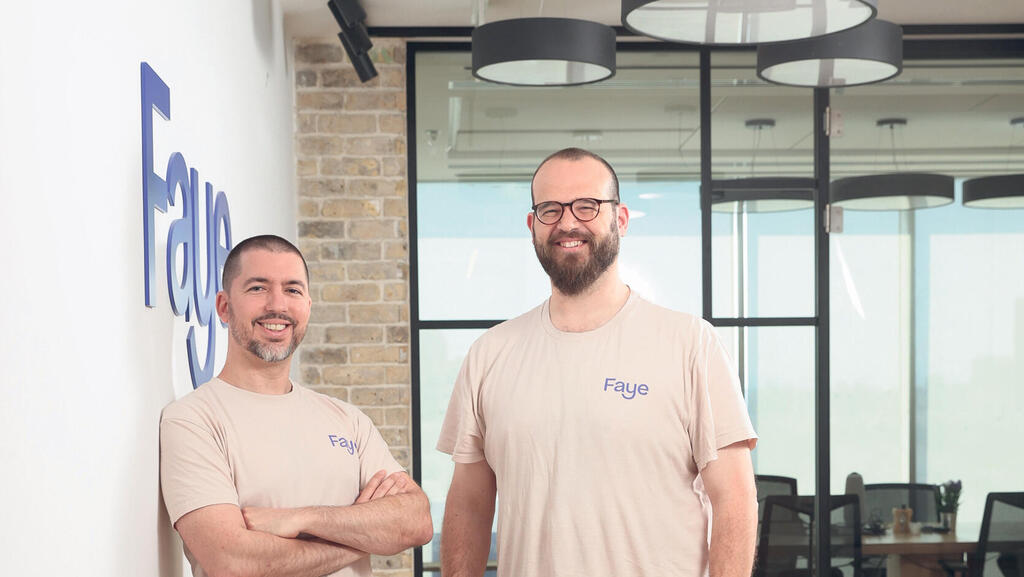
Most Promising Startups - 2024
"For Americans, Faye has become part of their passport"
Insurtech company Faye is disrupting the American travel insurance world, which has only begun to wake up in recent years. Founders Elad Schaffer and Daniel Green say that comparisons to other insurtech companies like Lemonade are inaccurate: "We have an opportunity to innovate in a market that hasn't seen innovation in years”
For the average Israeli, purchasing travel insurance abroad is a given. Just as the rate of supplementary insurance in Israeli HMOs is one of the highest in the world, so too is the rate of Israelis that purchase travel insurance abroad. For Americans, however, it's a completely different story. Most Americans only realized the need for travel insurance following the COVID-19 pandemic and its consequences, which has been one of the strongest forces driving the growth and success of Israeli insurtech company Faye.
While Israelis mainly purchase travel insurance in case something happens when they’re abroad, Americans, many of whom have only recently discovered travel insurance, primarily purchase it as protection against flight cancellations or delays. Many Americans have learned the hard way the chance of getting a ticket refunded when one has to cancel due to illness. Additionally, flight cancellations are a common issue for American airlines, which Israelis have only become familiar with in the past year since many flights to Israel were canceled. American statistics show that 1% of flights are canceled every day, unrelated to extreme weather. During storms and other weather incidents, the rate of canceled flights daily jumps to 10%.
Meanwhile, the American travel insurance market has been growing in recent years. While the majority of Israelis always travel with travel insurance, less than 40% of American travelers do. However, 68% now say they are interested in such insurance. According to Elad Schaffer, Co-Founder and CEO of travel insurance company Faye, the market penetration rates are extremely low at only about 10%. Despite this, the American travel insurance market already generates $6 billion, indicating a vast untapped potential.
In Israel, Faye's solution is good, but not revolutionary, as there is already a highly developed insurtech industry here, but for Americans, it's a dramatic disruption, with numerous consumer articles, comparison articles, and interviews with Schaffer dedicated to Faye's solution, which is something like a combination of PayPal and Lemonade.
A second startup together
In 2023, the Wall Street Journal chose Faye's insurance solution as its product of the year in the field. All insurance procedures are conducted via an app, through which one can build insurance coverage or request reimbursement immediately, bypassing the tedious process of submitting invoices. In many recent comparison articles dedicated to the topic, Faye competes primarily against traditional insurance solutions from companies like Allianz, Generali, AXA, and even Warren Buffet's Berkshire Hathaway Insurance Company. In these comparisons, Faye wins in terms of convenience, ease of operation, and reimbursement, although it is generally slightly more expensive than its competitors. However, Faye is looking to become much more, which is hinted at in the company name.
"Daniel is a big expert in aviation and travel. He solves everything for you in a minute, from missing a connection to finding the shortest walking route in London-Heathrow Airport," says Schaffer, discussing what led him to found Faye with his partner Daniel Green in 2019. "Daniel can foresee problems and flight changes even before the pilot knows about it," he jokes.
Schaffer, 39, met Green, 40, when he made aliyah from Australia 15 years ago. Schaffer had just finished six years of service in an IDF intelligence unit, and Green was a tech genius. Faye is already the second startup they’ve founded together. Their first startup, a consulting platform that gathers experts from various fields to assist large organizations and governments, was bootstrapped, meaning that it had no external funding. They appointed a CEO for the first startup and continued on to found Faye, a sort of travel fairy godmother, assisting with any arising questions. Faye was originally called ‘ZENNER,’ from the word 'zen,’ as the founders wanted to make travelers feel more relaxed.
"The insurance itself is important and central - it covers travel, health, luggage, pets — and immediately," explains Schaffer. "But there are two more dimensions to the app that traditional insurance companies don’t deal with. The first is active solutions, like what to do if you lose your passport or a connecting flight. Sometimes it's just useful advice, but sometimes there's a direct route for booking an alternative flight. The third dimension is what we call travel intelligence, which provides alerts regarding any possible disruptions in the journey, from flight delays to terrorist attacks at the destination or unusual weather. The fourth aspect of Faye's app is the financial side, from finding good currency exchange rates to solutions for saving money for the next trip."
Confident in profitability
Faye, which currently operates in all 50 states but is only available in the United States, began selling its insurance two years ago and has since grown rapidly, disrupting the dull and sluggish market dominated by insurance giants who hadn’t sought much innovation until now. According to Schaffer, 70% of those who downloaded the Faye app return and use it afterward: "For Americans, it's becoming like a part of the passport," he says. Sales are growing rapidly, and Faye's revenues have long exceeded $10 million, with aspirations to reach sales of over $100 million within two years.
Faye currently employs 60 people, 40 of whom are in Israel, where they’ve hired executives from Israeli fintech and insurtech companies such as Lemonade, Melio, and Guesty. The comparison to Lemonade is, of course, inevitable, and along with it arises the question: unlike Lemonade, does Faye have a future as an independent company that can reach profitability and sustain it?
"Travel insurance is completely different from the insurance Lemonade specializes in, and it can reach profitability quite quickly," answers Schaffer. "I return the investment on the first policy the customer buys with Faye because the payment percentages are much lower and the loss ratio is much lower," he adds. This means that even in the event of an insurance event, such as missing a flight due to illness, a flight delay, or a medical emergency, the costs are limited and, in most cases, there won't be groups of customers suffering from the same issue. This is in contrast to Lemonade, which deals with property and structure insurance and sometimes suffers from unusual weather events that affect entire groups of insured homes, resulting in significant losses.
And just like Lemonade, Next, or Hippo, the Israeli insurtech companies that succeeded in disrupting the American insurance market, Faye also has no intention of entering Israel’s local market. "We have an opportunity to innovate in a market that has not seen innovation for years, so it is also exploding now. In Israel this is no longer new, there are companies such as Passportcard that work excellently (we brought one of its senior executives to be a consultant at Faye) and the local market is saturated," says Schaffer.
Company ID:
Faye
Sector: Insurtech
Established: 2019
Founders: Elad Schaffer and Daniel Green
Employees: 60, in Israel and the United States
Funding: $20 million from Viola, F2, and Munich Re














